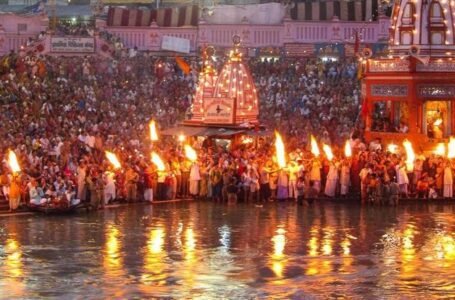PrideOfied – The Aravan Clan God of Transgenders
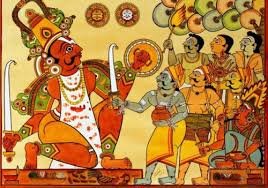
Aravan or Iravan was the son of Arjuna and the Naga princess Ulupi. He was killed by the Kauravas in the Kurukshetra conflict, but according to legend, he dedicated his life to the Goddess Kali to secure the Pandavas’ triumph in the war. In India, he is also known as the god of the transgender population. His references can also be found in the Vishnu Purana and the Bhagavata Purana, in addition to the Mahabharata.
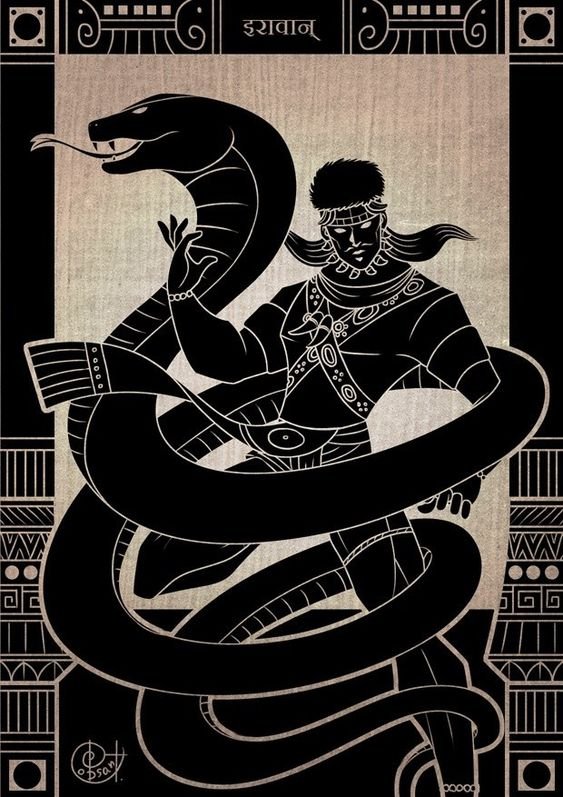
When the five Pandavas wedded Draupadi, they made a rule that whenever one of them was sitting with her, the other four must withdraw to the jungle for twelve years and live as a celibate. Some bandits stole a Brahmin’s livestock one day, and while they were hauling them away, the Brahmin ran to the Pandavas and requested for assistance. Arjuna agreed to assist him, but his weapons were kept in a room where Yudhishthira was relaxing with Draupadi. As a result, Arjuna was obliged to enter the chamber and draw his swords in order to assist the Brahmin. As a result, he disobeyed the rule and was sentenced to a 12-year exile into the woods.
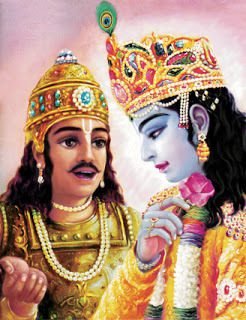
Arjuna arrived at the Ganges’ source while travelling from place to place and chose to stay for a bit. He entered the Ganges water to conduct ablution one day when he was dragged into the water by Ulupi, the Naga princess, who was overcome by sexual desire. She communicated her desire to him, but he refused, claiming that he was intended to be celibate for the duration of his exile, which was twelve years. Ulupi then threatened to commit suicide if he did not fulfil her wish. Instead of being held responsible for a woman’s death, Arjuna chose to breach his chastity vow and spend the night with her in her palace. The next morning, after saying goodbye to Ulupi, he continued his journey. After this, Ulupi got pregnant and gave birth to Aravan.
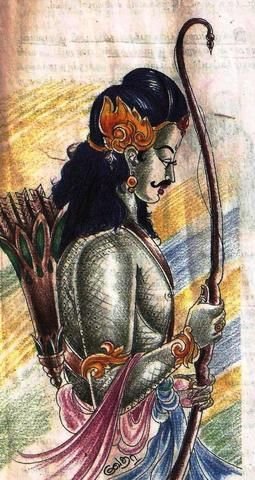
Aravan grew up in the Nagas’ territory with his mother, and when he heard that Arjuna had gone to the heavenly planets, he went to see him. “I am Aravan, your son by Ulupi,” he said as he approached his father. After that, Arjuna embraced Aravan and the two spent a lot of time together. “When the big war takes place, I shall seek your support,” Arjuna said as Aravan left the heavenly planets. “When I receive your word, I will come to help you,” Aravan assured his father. Aravan arrived in Kurukshetra with several celestial horses now that the fighting had begun. These horses were capable of flying above the ground and trampling oncoming warriors and riders. Aravan was destroying and thinning out opposing lines throughout the day’s general fight. Gaya, Gavaksha, Vrishava, Charmavat, Arjava, and Suka, Shakuni’s younger brothers, approached him to confront him. They found him and surrounded him with their divisions of warriors. The Pandavas’ defence lines were destroyed by Gandhara soldiers who were eager to fight.
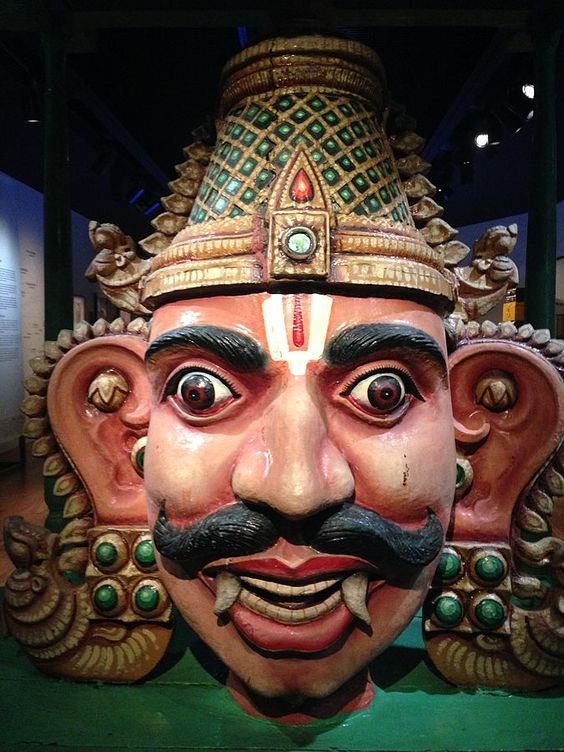
Aravan issued a challenge to his warriors, and a massive battle ensued. Aravan’s divisions gradually gained the upper hand, infuriating Shakuni’s younger brothers. On the front lines, they assaulted him. They unleashed a barrage of lances and arrows, confident that they would defeat Arjuna’s son. Those guns hit Aravan in a number of areas. He took the lances away and hurled them at Shakuni’s brothers. He then descended from his chariot, sword and shield in hand. Shakuni’s brothers surrounded him, attempting to kidnap him. He severed their right and left arms and disfigured their bodies when they got too close. They tumbled from their chariots, having been robbed of their lives. Only Vrishava, who had been lacerated by a variety of weapons, escaped with his life.
Duryodhana, seeing the slaughter of Shakuni’s brothers, ordered Alambhusha, the Rakshasa prince, to slay Aravan. Alambusha began showing his magical illusions under Duryodhana’s command. Many mighty horses, ridden by terrible Rakshasas wielding spears and battleaxes, were created by him. They numbered two thousand and rushed towards Aravan. They were quickly defeated, though, by Arjuna’s son. Aravan was then confronted by Alambusha, who unleashed his blood-sucking arrows. Aravan shattered his arrows and bow as he got close enough. He rose into the air and proceeded to demonstrate his mystic illusions after seeing his bow cut. Aravan ascended into the skies and engaged the magical Rakshasa in battle. He severed his arms and hacked at his body. However, the Rakshasa produced more arms by the dint of his mystic power. Aravan repeatedly cut him with his battleax and caused him to bleed profusely. Alambusha then expanded his form and tried to capture Aravan, but Aravan also produced mystic illusions that baffled Alambusha.
A celestial serpent from his mother’s side came to Aravan’s aid. It assumed a huge form like Lord Ananta. Producing many Nagas, they assaulted the huge Rakshasa. While being attacked, Alambusha momentarily reflected and then immediately assumed a form like Garuda and devoured those mystic Nagas. Seeing the celestial serpent baffled, Aravan was bewildered. While in that state, Alambusha cut off Aravan’s head with his mighty sword. When Arjuna’s son was slain, the Kaurava army appeared overjoyed, and encouraged in this way, they began to overthrow the battle lines of their enemy. Alambusha was later killed by Ghatatkocha, the cousin of Aravan, thus avenging his death.
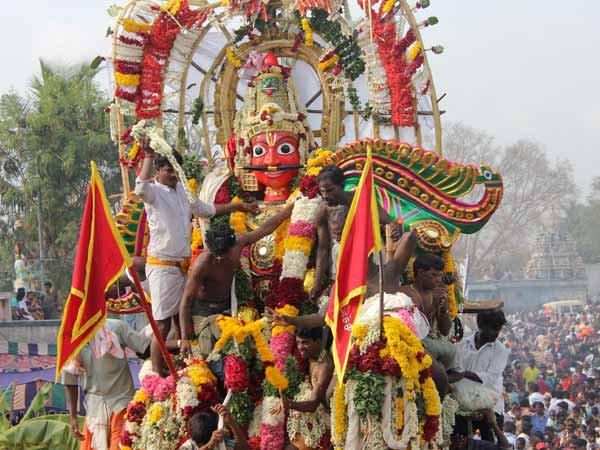
No side appeared to be winning even after the Kurukshetra War had lasted seven days. To appease the battle goddess Kali, Lord Krishna chose to make a human sacrifice of a person with 36 favourable marks. At the time, the Pandavas’ side had only three soldiers who exhibited those signs. Arjuna, Krishna, and Aravan were the three. Only Aravan was expendable among them. As a result, Lord Krishna persuaded him to sacrifice himself for the greater good. Aravan was a great warrior who didn’t mind, but he was single and didn’t want to die as a bachelor. As a result, he expressed his desire to marry before his death to Lord Krishna. Pandavas, on the other hand, could not locate a woman who would be his wife for a night and then be a widow for the rest of her life. As a result, Lord Krishna assumed the shape of Mohini and wed Aravan. They stayed together for the night. The next day, Aravan offered himself to the goddess Kali, assuring the Pandavas’ triumph.

In the religion that bears his name and in which he is the primary deity, Aravan is known as Kuttantavar. Aravan and Mohini’s marriage, her widowhood, and grieving following Aravan’s sacrifice are the core themes of an 18-day annual festival held either side of the full moon night in the Tamil month of Cittirai. The Alis or Aravanis (transgenders) participate in the Koovagam festival by reenacting Aravan and Mohini’s marriage. All of the Aravanis are said to be married to Aravan, thus when the sacrifice is reenacted, the Aravanis become Aravan’s widows and grieve his death.


